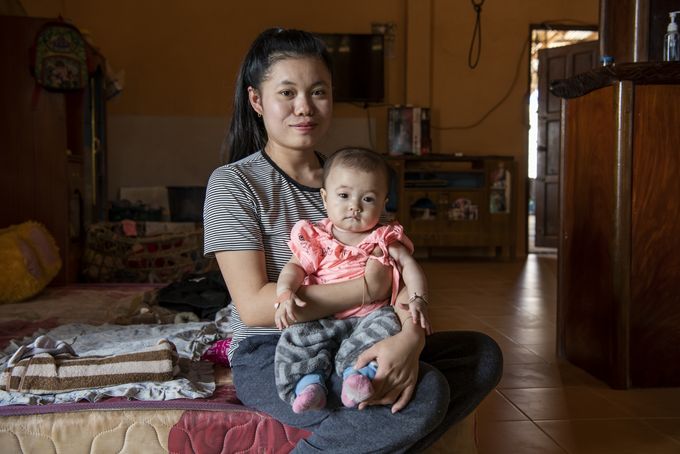Financial Support Significantly Improves Breastfeeding Success in Lao PDR
17.12.2024
A new study by Swiss TPH in Lao PDR found that financial support significantly increases exclusive breastfeeding rates amongst new mothers in Lao PDR. These findings, published in JAMA Pediatrics, highlight the potential of cash transfers to improve maternal and child health by promoting adherence to World Health Organization (WHO) recommendations for exclusive breastfeeding for the first six months of an infant's life.

Financial support increases the chance of mothers continuing breastfeeding. (Photo: Olivier Brandenberg/Swiss TPH)
Exclusive breastfeeding provides vital nutrients that strengthen infants’ immune systems and support healthy growth. It also aids maternal recovery and reduces long-term health risks, including certain cancers. Despite these benefits, many mothers are unable to maintain exclusive breastfeeding due to economic pressures and the necessity of returning to work shortly after childbirth.
The study titled, Social Transfers for Exclusive Breastfeeding (STEB), involved 298 new mothers from Vientiane, Lao PDR. Participants were randomly assigned into three groups: a control group receiving educational materials only, a group receiving educational materials plus financial or in-kind support on the condition they exclusively breastfeed for six months, and a third group receiving education plus unconditional financial support, regardless of breastfeeding status.
Results showed that mothers who received conditional financial support had a 4.6-fold increase in exclusive breastfeeding rates at six months compared to the control group. Meanwhile, those in the unconditional support group were 2.5 times more likely to breastfeed exclusively for six months. These findings suggest that even non-conditional financial support can help mothers maintain breastfeeding longer.
Jordyn Wallenborn, the study’s lead researcher, emphasized the importance of these results: “This trial demonstrates that financial incentives, particularly when conditional, can be a powerful tool in promoting exclusive breastfeeding, which is key for infant health in the critical early months of life.”
Overcoming Economic Barriers
While educational campaigns are commonly used to promote breastfeeding, this study found that financial incentives may be more effective. Although all participants received educational materials about the benefits of breastfeeding, exclusive breastfeeding rates were significantly higher in the intervention groups control (32.05% and 50%) than in the control group (17.95%). These findings highlight the need to pair education with financial support to achieve better breastfeeding outcomes. However, despite these positive results, it is essential to take a holistic approach, recognising that breastfeeding women require a range of support – emotional, social, and practical – beyond financial incentives.
Policy Implications
The success of the STEB study suggests that cash transfers could be an effective tool for promoting exclusive breastfeeding, especially in countries with high child malnutrition rates. However, implementing such programs may pose challenges, including the need for monitoring compliance and addressing fairness concerns.
The study was conducted by Swiss TPH in collaboration with the Lao Tropical and Public Health Institute. The work was funded by the Swiss National Science Foundation and the University of Basel Forschungsfonds.
Contact

Jordyn Wallenborn
Dr.
Scientific Project Leader
+41612848630
jordyn.wallenborn@swisstph.ch
Stay connected
Subscribe to our newsletter and get all the latest research news, project updates, course and event listings from Swiss TPH.